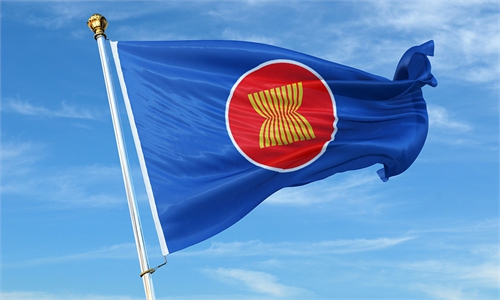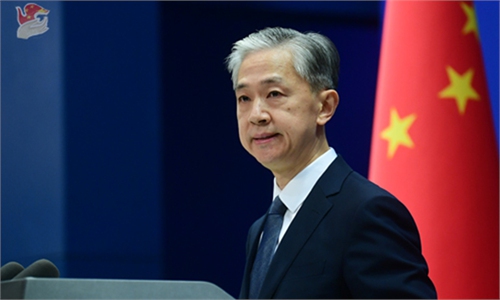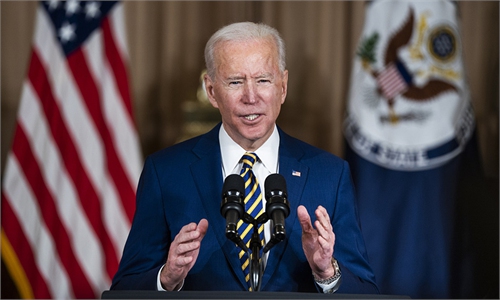ASEAN foreign ministers’ visit to China a continuation of longstanding ties and tradition to discuss hotspot issues: experts
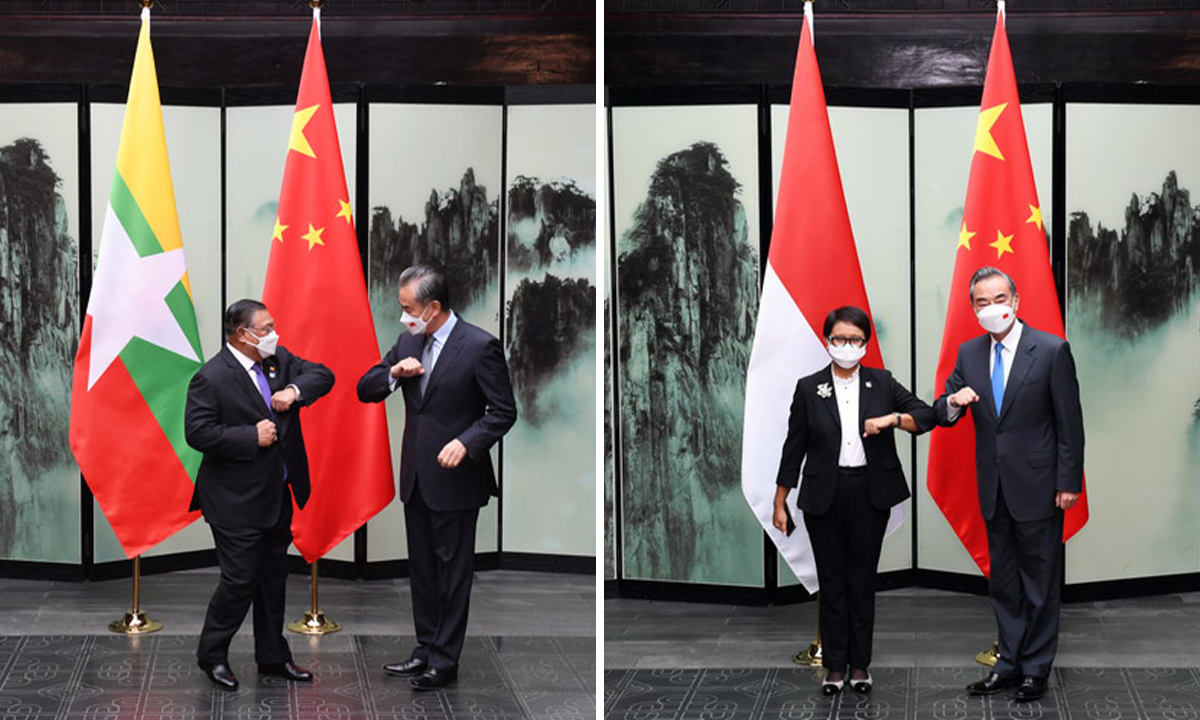
Photo: Ministry of Foreign Affairs
Chinese State Councilor and Foreign Minister Wang Yi had met with at least three foreign ministers from members of the Association of Southeast Asian Nations (ASEAN) in recent days, as they exchanged views on China-ASEAN friendly relationship, regional and international topics including the Ukraine issue.
Chinese experts said their visit to China is a continuation of longstanding China-ASEAN relations and the tradition of negotiation and coordination over current hotspot issues, such as the neutrality stance over the Ukraine crisis, dismissing US media reports' attempt to slander China-ASEAN ties amid aborted US-ASEAN Summit.
News released by Ministry of Foreign Affairs showed Wang had respectively met with Thai Deputy Prime Minister and Foreign Minister Don Pramudwinai on Saturday, Myanmar's Foreign Minister U Wunna Maung Lwin on Friday and Indonesian Foreign Minister Retno Marsudi on Thursday in Tunxi, East China's Anhui Province.
Visiting foreign inister of the Philippines is also expected to meet Wang.
In meeting with Don Pramudwinai, Wang said China is willing to advance all-round cooperation with Thailand, step up consultations on the "Belt and Road" cooperation outline and accelerate the construction of the China-Thailand Railway, connect it with the China-Laos Railway in the north, as well as the Thailand-Malaysia-New Railway in the south, so as to help the middle line of Trans-Asian railway to become fully connected.
In a joint statement released following the meeting between Wang and Don Pramudwinai, China and Thailand called for continued peace talks between Russia and Ukraine until a peace agreement is reached and the avoid of large-scale humanitarian crisis and the curb of negative spillover effects on global economic recovery as well as valuing the hard-won peaceful development of the Asian region.
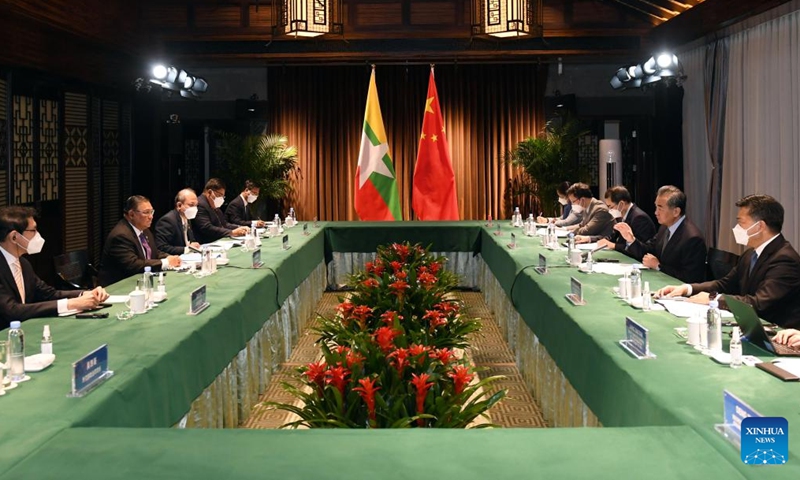
Chinese State Councilor and Foreign Minister Wang Yi meets with Myanmar's Foreign Minister U Wunna Maung Lwin in Tunxi, east China's Anhui Province, April 1, 2022.Photo:Xinhua
During a meeting with U Wunna Maung Lwin, Wang said China has always placed Myanmar in an important position in its neighborly diplomacy and is ready to work with Myanmar to deepen exchanges and cooperation in all areas to achieve the goal of building a China-Myanmar community with a shared future including the acceleration of the construction of the China-Myanmar Economic Corridor (CMEC) and better carry out major landmark projects.
Wang said Myanmar is a member of the ASEAN family and hopes ASEAN countries will adhere to the ASEAN approach, maintain unity, make a unified voice, and work with Myanmar to constructively implement the ASEAN "five-point consensus" based on the principle of non-interference in internal affairs of other countries.
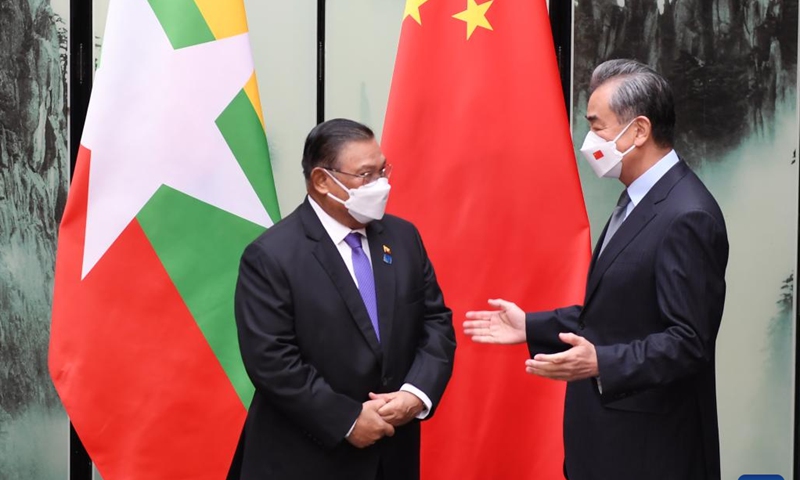
Chinese State Councilor and Foreign Minister Wang Yi meets with Myanmar's Foreign Minister U Wunna Maung Lwin in Tunxi, east China's Anhui Province, April 1, 2022.Photo:Xinhua
U Wunna Maung Lwin expressed concerns about how international changes are affecting his country's economy. Wang said China is willing to coordinate and help Myanmar overcome difficulties, stressing a joint effort is needed to deal with the negative spillover effects of the Ukraine crisis and oppose unilateral sanctions and long-arm jurisdiction.
China and Indonesia are both major developing countries and representatives of emerging economies, and the two sides share broad common interests and have deepened mutually beneficial cooperation, Wang said to Retno.
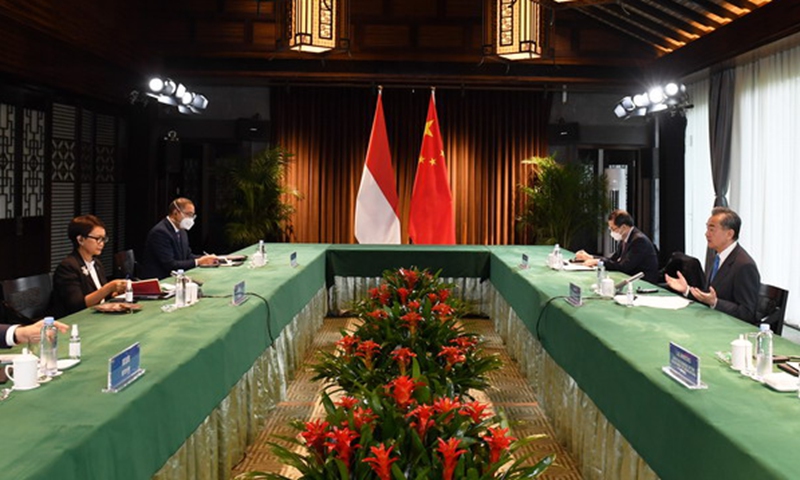
Photo:Ministry of Foreign Affairs
In a meeting between Wang and Retno, the two exchanged views on deepening the China-ASEAN comprehensive strategic partnership and agreed to formulate an action plan as soon as possible to strengthen the coordination between the Belt and Road Initiative and the ASEAN Outlook on the Indo-Pacific in key fields.
Wang said the aims and objectives of the ASEAN Outlook on the Indo-Pacific are quite different from the US Indo-Pacific strategy, which aims to provoke camp confrontation and tension in the region. All parties should be vigilant and prevent the resurgence of the Cold War mentality in the region.
Chinese Foreign Ministry had said the visit of ASEAN foreign ministers not only reflects China's intimate relations with its neighboring countries, but also the high expectation from all sides to promote China-ASEAN cooperation.
However, US media tended to interpret ASEAN foreign ministers' China visit by linking it with the postponement of the US-ASEAN summit which was scheduled to take place from March 28-29. The Biden administration announced to postpone indefinitely the summit last week due to unspecified scheduling problems.
A Politico report on Thursday claimed that the aborted US-ASEAN Summit has "handed China an unlikely propaganda victory." It said "US-ASEAN relationship is struggling because Southeast Asia is basically the backyard of China," and "ASEAN has been effectively divided by China."
"This is nonsense and reflects US media's sour grape mentality," Li Kaisheng, research fellow and deputy director at the Institute of International Relations of the Shanghai Academy of Social Sciences, told the Global Times. Unwilling to see the development of friendly cooperation between China and ASEAN countries, some US media outlets are deliberately twisting and slandering China's ties with relevant ASEAN countries, Li noted.
China's relationship with ASEAN countries has its own logic. The four ASEAN countries' foreign ministers' China visit is a continuation of longstanding China-ASEAN friendly changes and the tradition of negotiation and coordination over current hotspot issues inside and outside the region, said Li.
China and ASEAN countries share similar stances on deepening regional economic cooperation as well as many other global issues. On the Russia-Ukraine conflict, the majority of ASEAN countries have taken a neutral stance and hope the issue can be solved through diplomatic talks instead of taking sides to worsen the whole situation, said Li.
The US and some other Western countries are calling to eject Russia from the G20, , putting Indonesia, this year's G20 chair, to walk on eggshells. Indonesia said it would hold the G-20 Summit neutrally and impartially, resisting calls from the West to exclude Russia from the annual meeting of the world's 20 largest economies over the Ukraine issue.
Indonesia and China agreed to strengthen coordination and cooperation in the G20. Wang said in a meeting with Retno that China firmly supports Indonesia in successfully hosting the G20 Bali Summit, stressing that the G20 should focus on macroeconomic policy coordination and should not be politicized. He added that all members are on an equal footing and no one has the right to divide the G20.
Different from the US, which always regards itself as a boss and tends to dictate others over what to do, China respects Indonesia and other ASEAN countries' independence, Li said. The neutrality of China and the majority of ASEAN countries over the Ukraine crisis indicates China and ASEAN countries are the peaceful forces of the world, Li said.
Zhang Tengjun, deputy director of the Department for Asia-Pacific Studies at the China Institute of International Studies, told the Global Times that ASEAN countries themselves know well who, between China and the US, is sincere in deepening cooperation and relations with them.
He added that although since the Biden administration assumed office has increased diplomatic engagements with ASEAN countries, it offered less but demanded more. "No wonder ASEAN countries in the region have doubts over whether Washington truly wants to develop ties with them or just view them as chess pieces in competition with China," Zhang said.


